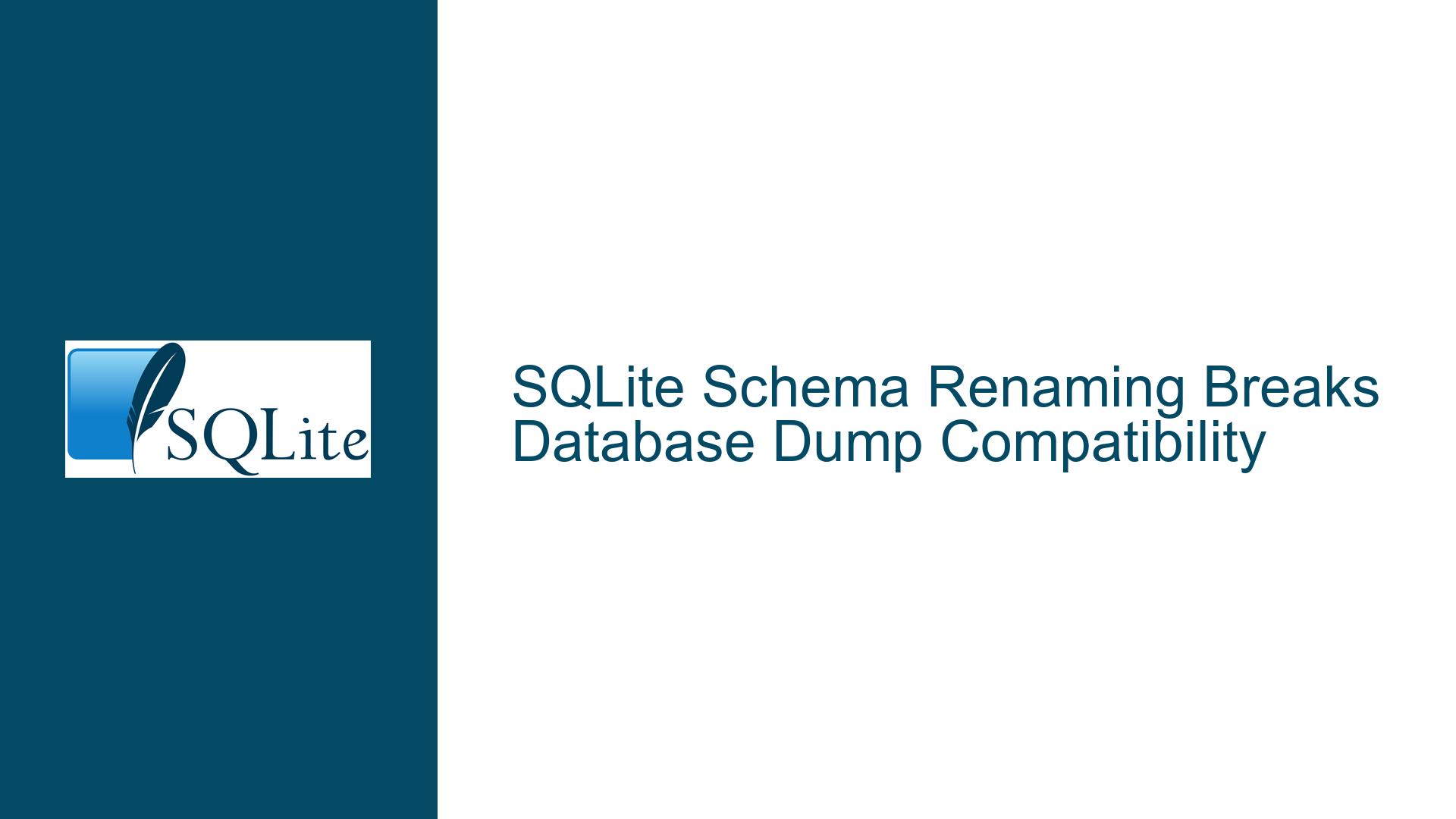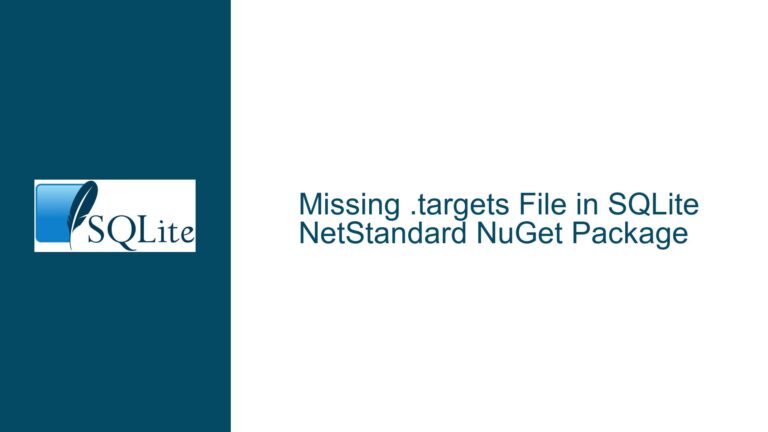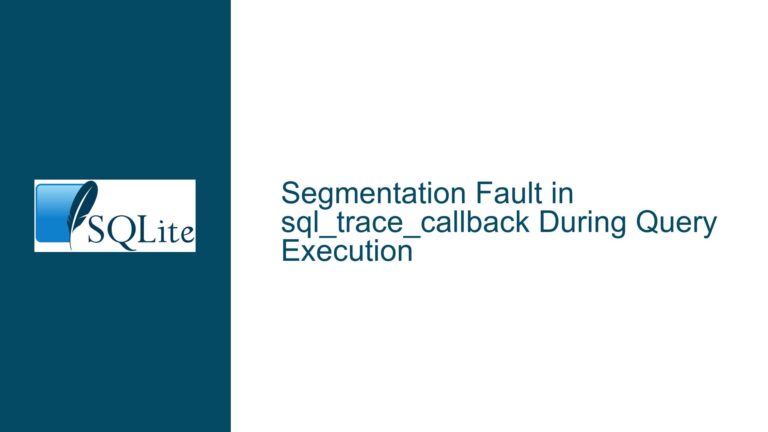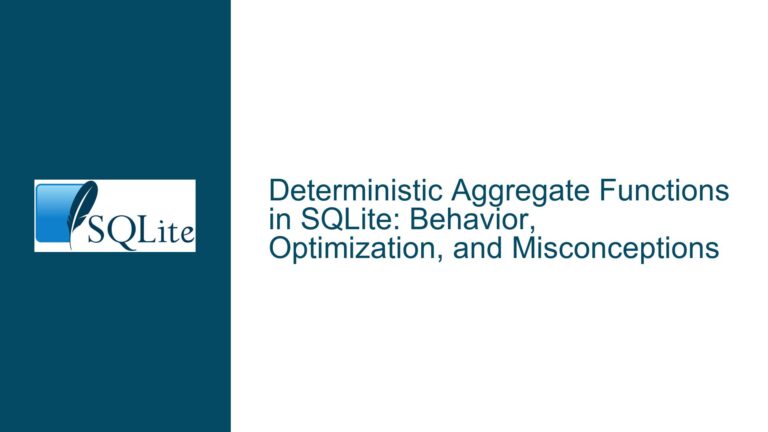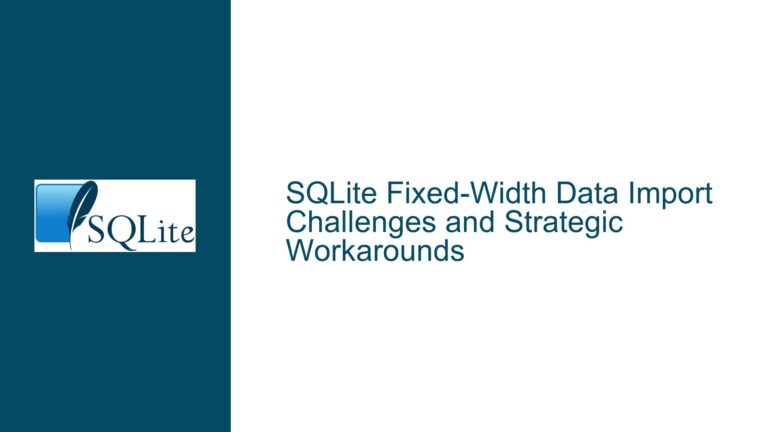SQLite Schema Renaming Breaks Database Dump Compatibility
Issue Overview: SQLite Schema Renaming and Its Impact on Database Dump Compatibility
The core issue revolves around a change introduced in SQLite version 3.33.0, where the internal schema table name was renamed from sqlite_master to sqlite_schema. This change, while seemingly minor, has significant implications for database dump compatibility, particularly when attempting to import dumps generated by SQLite 3.33.0 or later into earlier versions of SQLite. The problem manifests in two primary ways:
First, the ANALYZE sqlite_schema command, which is now included in database dumps generated by SQLite 3.33.0 and later, fails when executed against earlier versions of SQLite. This is because earlier versions of SQLite do not recognize the sqlite_schema table name; they only recognize sqlite_master. Consequently, the ANALYZE command fails, and the sqlite_stat1 table, which is normally created by this command, is not created.
Second, the failure to create the sqlite_stat1 table leads to subsequent failures when the dump attempts to insert data into this table. This is because the sqlite_stat1 table is used by SQLite’s query planner to store statistical information about the database, and its absence can lead to suboptimal query performance. The failure to create this table and insert data into it can therefore have a cascading effect on the performance of queries executed against the imported database.
This issue is particularly problematic for users who need to maintain compatibility between different versions of SQLite, such as those who are migrating databases between systems running different versions of SQLite or those who are working in environments where multiple versions of SQLite are in use. The incompatibility introduced by the schema renaming can lead to significant disruptions in workflows, requiring users to manually modify database dumps or find other workarounds to ensure compatibility.
Possible Causes: Schema Renaming and Its Consequences
The root cause of this issue lies in the renaming of the internal schema table from sqlite_master to sqlite_schema in SQLite version 3.33.0. This change was made as part of a broader refactoring effort aimed at improving the consistency and clarity of SQLite’s internal schema representation. However, this change inadvertently introduced a backward compatibility issue, as earlier versions of SQLite do not recognize the new sqlite_schema table name.
The ANALYZE command, which is used to generate statistical information about the database, is particularly affected by this change. In SQLite 3.33.0 and later, the ANALYZE command is generated with the sqlite_schema table name, but this command fails when executed against earlier versions of SQLite, which only recognize the sqlite_master table name. This failure prevents the creation of the sqlite_stat1 table, which is used by SQLite’s query planner to store statistical information about the database.
The absence of the sqlite_stat1 table can have a significant impact on query performance, as SQLite’s query planner relies on the statistical information stored in this table to make informed decisions about how to execute queries. Without this information, the query planner may make suboptimal decisions, leading to slower query execution times and reduced overall database performance.
In addition to the immediate impact on query performance, the failure to create the sqlite_stat1 table can also lead to further issues when attempting to insert data into this table. Since the table is not created, any subsequent INSERT commands targeting the sqlite_stat1 table will fail, potentially leading to incomplete or inconsistent database dumps.
Troubleshooting Steps, Solutions & Fixes: Ensuring Compatibility Across SQLite Versions
To address the compatibility issues introduced by the renaming of the internal schema table, several approaches can be taken. These approaches range from simple workarounds to more comprehensive solutions that ensure compatibility across different versions of SQLite.
1. Manual Modification of Database Dumps:
One straightforward approach is to manually modify the database dump generated by SQLite 3.33.0 or later to replace instances of sqlite_schema with sqlite_master. This can be done using a text editor or a command-line tool such as sed. For example, the following command can be used to modify a database dump:
sed -e 's/sqlite_schema/sqlite_master/g' modern_dump.sql > archaic_dump.sql
This command replaces all occurrences of sqlite_schema with sqlite_master in the modern_dump.sql file and saves the modified dump as archaic_dump.sql. The modified dump can then be imported into earlier versions of SQLite without encountering the compatibility issue.
However, this approach has some limitations. First, it requires manual intervention, which may not be feasible in automated or scripted environments. Second, it may inadvertently modify other parts of the dump that contain the string sqlite_schema, such as text data or identifiers. Care must be taken to ensure that only the intended changes are made.
2. Using the .once Command in the SQLite Shell:
Another approach is to use the .once command in the SQLite shell to redirect the output of the .dump command to a file and then modify the file using a command-line tool such as sed. For example:
sqlite3 modern_db.sqlite ".once | sed -e 's/sqlite_schema/sqlite_master/g' > archaic_dump.sql" ".dump"
This command generates a database dump from the modern_db.sqlite database, pipes the output through sed to replace sqlite_schema with sqlite_master, and saves the modified dump as archaic_dump.sql. This approach combines the generation and modification of the dump into a single command, reducing the need for manual intervention.
3. Conditional Logic in Scripts:
For users who need to maintain compatibility across multiple versions of SQLite, conditional logic can be added to scripts to handle the schema renaming issue. For example, a script could check the version of SQLite being used and generate the appropriate ANALYZE command based on the version. This approach requires more advanced scripting skills but provides a more robust solution that can handle different versions of SQLite automatically.
4. Upgrading Earlier Versions of SQLite:
In some cases, the simplest solution may be to upgrade earlier versions of SQLite to version 3.33.0 or later. This ensures that all systems are using the same version of SQLite and eliminates the compatibility issue. However, this approach may not be feasible in all environments, particularly those where upgrading SQLite is not possible due to system constraints or organizational policies.
5. Custom Dump Utility:
For users who require a more tailored solution, a custom dump utility can be developed that generates database dumps with the appropriate schema table name based on the target SQLite version. This approach provides the most flexibility but requires significant development effort and ongoing maintenance.
6. Documentation and Communication:
Finally, it is important to document the compatibility issue and communicate it to all relevant stakeholders. This includes developers, database administrators, and other users who may be affected by the issue. Clear documentation can help prevent confusion and ensure that everyone is aware of the steps needed to maintain compatibility across different versions of SQLite.
In conclusion, the renaming of the internal schema table from sqlite_master to sqlite_schema in SQLite version 3.33.0 has introduced a backward compatibility issue that affects database dump compatibility. This issue can be addressed through a variety of approaches, ranging from manual modification of database dumps to more comprehensive solutions such as conditional logic in scripts or custom dump utilities. By understanding the root cause of the issue and implementing the appropriate solution, users can ensure compatibility across different versions of SQLite and maintain optimal database performance.
